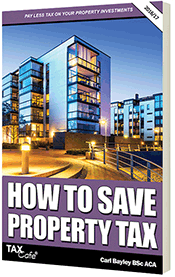Unmarried Couples:
Transferring Property
Unmarried Couples Can Save Capital Gains Tax
“A long-term tenant recently moved out of a buy-to-let flat I own. I am thinking of selling the property but want to know how much capital gains tax I am likely to pay. The property is worth around £100,000. Net of all buying and selling costs I am sitting on a capital gain of approximately £30,000. I am a company director and a higher-rate taxpayer. The property is owned solely by me but I was thinking of transferring a share to my common-law partner (I am not married) if this will save some tax. She is also a higher-rate taxpayer.”
The latest information can be found in our guide:
How to Save Property Tax
This is an interesting question with lots of tax planning consequences.
If the reader sells the property during the current tax year and is the sole owner, he will probably pay capital gains tax of £5,432:
£30,000 less £10,600 CGT exemption x 28% tax = £5,432
Capital gains tax can be saved by transferring a share of a property to a spouse or common-law spouse. Why? This allows an extra CGT exemption to be used which can reduce the tax bill by up to £2,968:
£10,600 x 28% = £2,968
Married vs Unmarried Couples
There is an important difference between married and unmarried couples. Transfers between married couples are tax free; transfers between unmarried couples are taxed like open market sales.
This has important implications when it comes to transferring shares of property.
If the reader was married he could transfer, say, half the property to his wife during the current tax year without any tax implications. The property could then be sold during the current tax year and the spouses could make use of two CGT exemptions. The tax bill would fall from £5,432 to £2,464:
£30,000 - £21,200 x 28% tax = £2,464
Because the reader is not married the transfer to his common-law wife will be taxed like an open market sale. If the property is then sold on the open market during the same tax year, he will also pay capital gains tax on his remaining share.
In effect he will end up paying capital gains tax on the whole property. His partner’s CGT exemption is irrelevant. She would only pay tax on any uplift in value after the transfer (probably none in this case).
This has two important tax implications for unmarried couples who want to transfer properties prior to selling them:
#1 It Takes Two
Firstly, an unmarried couple that wants to sell a property shortly will generally only save tax if the transfer and actual sale of the property take place over two tax years. This allows the person transferring the property share to make use of a second year’s CGT exemption.
So our reader could consider transferring a share of the property to his partner during the current tax year and then selling it in 2012/13 or a later tax year. This will allow him to use one CGT exemption this year and one CGT exemption in a later tax year.
#2 Not All Transfers Are Equal
Because unmarried couples pay tax when they transfer property to each other, a straight 50% transfer may not be advisable. If the reader in this example transfers 50% of the property, he will have to pay tax on 50% of the gain (£15,000). The first £10,600 will be tax free but the remainder will be taxed at 28%, resulting in a tax bill of £1,232 in 2011/12.
The reader could consider transferring approximately 35% of the property to his partner so that the capital gain on the transfer (around £10,500) is fully covered by his CGT exemption and no tax is payable in 2011/12:
£10,600/£30,000 = 35,33%.
The reader will, of course, probably still end up paying capital gains tax on his remaining share when the property is sold but at least a tax deferral can be achieved, if the property is only sold in 2012/13.
There are several other issues that both married and unmarried couples should remember before transferring property:
- Cost and Legality. Transferring a share of a property to another person will probably result in some legal costs. You will have to weigh these costs against the tax savings. If the property has a loan secured against it, you may need permission from the lender before changing the ownership of the property.
- Timing. If you transfer a property to your spouse or common-law spouse immediately prior to selling it, the transaction could be challenged on anti-avoidance grounds. To reduce the risk of a challenge you should probably make any such transfer before the property is offered for sale on the open market. The bigger the gap between the transfer and an unconditional sale contract the better.
Further Tax Savings
A married couple can enjoy further tax savings when property is transferred to a spouse who is a basic-rate taxpayer. Some of the gain will then taxed at 18% instead of 28%.
The basic-rate band for 2011/12 is £35,000, so transferring a share of a property to a person with very little or no income can save an extra £3,500 in capital gains tax this year:
£35,000 x 10% (28% - 18%) = £3,500
With unmarried couples the income of the transferee is irrelevant if the property is sold soon after the transfer, before any further uplift in the value of the property.
However, the reader in this example, who is a company director, could consider paying himself a lower dividend during the tax year in which the property is sold. This will free up some of his basic-rate band, allowing some of the gain to be taxed at 18%.






